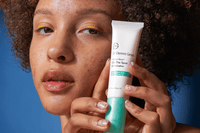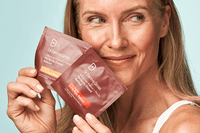All About: Lactic Acid for Skin
4 min

What is Lactic Acid?
Lactic acid is an alpha hydroxy acid (AHA) traditionally derived from milk, although vegan sources (such as beets and corn starch) are now available, as well as synthetic versions.
What does Lactic Acid do?
Like all AHAs, lactic acid increases cellular turnover, which reveals more radiant skin and a fresher complexion. By exfoliating the skin’s surface, you also reduce the chance of dead cells clogging a pore and causing a breakout. AHAs also stimulate the production of collagen over time, which ultimately leads to fewer fine lines and firmer skin.
Lactic acid is special because, in addition to possessing all the qualities of a typical AHA, it also enables the skin to produce ceramides. Ceramides are essentially lipids that hold skin cells together, strengthening the skin barrier. This, in turn, keeps moisture in the body and irritants out—a win-win.
As if that weren’t enough, lactic acid is also a free radical-scavenging antioxidant. It’s particularly adept at neutralizing free radicals in the upper layers of skin. As you surely know, free radicals are responsible for weakening skin’s support structures (think collagen and elastin). Because there are so many varieties of free radicals floating around, an antioxidant cocktail approach, mixing different types of antioxidants, is the most effective way to ensure your skincare is canceling out as many free radicals as possible.
Who is Lactic Acid for?
Larger in size than glycolic acid (the granddaddy of AHAs), lactic acid is often recommended for dry or sensitive skin types because it doesn’t penetrate as deeply, making it less likely to cause irritation. (Exfoliation is still essential for dry skin in order to eliminate flaky patches on the face or body.)
In general, AHAs are considered safe for new moms. However, if you’re pregnant or nursing, you should check with your doctor first before starting lactic acid (as you would with any skincare ingredient).
Who should skip it: As noted above, lactic acid is often the AHA of choice for sensitive skin. However, if you have the kind of hypersensitive skin that reacts to everything, no matter how gentle, lactic acid is not for you. Ditto if you’re dealing with a sunburn or have any cuts or other open areas of skin.
Where you can find it: Lactic acid is widely available. It’s typically its most potent in serum form, although you’ll see lactic acid pop up in peels, cleansers, and moisturizers for face or body.
You can find lactic acid in the cocktail of AHA/BHAs in the transformative collection of Alpha Beta skincare by Dr. Dennis Gross. Our two-step peels combine the exfoliating power of acids like lactic acid and anti-inflammatory ingredients to give you smoother, clearer skin.
Discover Dr. Dennis Gross Skincare for All Your Skincare Needs
For more skincare tips from the experts at Dr. Dennis Gross, check out our blog’s newest content today. Shop the collection of Dr. Dennis Gross bestselling skincare backed by dermatologists.
Written By
Ben Gentzler
Ben Gentzler has worked in the beauty industry for 17 years — 10 of which were spent in clinical skincare. He is a licensed esthetician with a passion for leading professional education on cutting edge treatments at top spas around the world and for training on the science of skin. Ben has trained directly with Dr. Dennis Gross, learning about the state of the art in skincare and working with his clients to help them achieve their best skin.
Read More from Ben Gentzler
Written By
Ben Gentzler
Ben Gentzler has worked in the beauty industry for 17 years — 10 of which were spent in clinical skincare. He is a licensed esthetician with a passion for leading professional education on cutting edge treatments at top spas around the world and for training on the science of skin. Ben has trained directly with Dr. Dennis Gross, learning about the state of the art in skincare and working with his clients to help them achieve their best skin.
Read More from Ben GentzlerRelated Articles
-

acne, author-ben-gentzler, skin-and-deeper April 03, 2024 — 6 minutes
Hit It: Introducing The Dr. Dennis Gross Alpha Beta On The Spot Eliminator
by Ben Gentzler
-

author-ben-gentzler, myth-busting, oily-skin, skin-and-deeper April 01, 2024 — 9 minutes
Myth busted: Yes, your oily skin does need a moisturizer
by Ben Gentzler
-

author-ben-gentzler, pro-tips, retinol, skin-and-deeper March 25, 2024 — 5 minutes
How to Use Perfectly Dosed Retinol Pads Like a Pro
by Ben Gentzler
Keep Reading
Stay up to date on the latest advice from our team of skincare experts.
Sign up to receive a monthly digest of skincare, wellness, and lifestyle tips.






